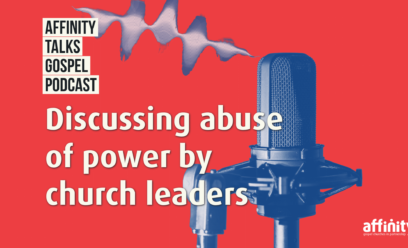Assisted dying: is society giving up on the vulnerable?
This article was first published in the Social Issues Bulletin – Issue 52: Spring 2023.

‘You wouldn’t let a dog die like that, so why do people have to?’
I’ve heard that argument a thousand times – people are dying in agony; why can’t we just make it legal to let doctors and nurses end their suffering by ending their lives? We do it for our pets, so why not our parents and grandparents?
It’s an emotive and compelling argument. We all want to know that our loved ones will have care and assistance at the end of their lives and that we will have that care ourselves when our turn comes. Putting someone out of their misery seems like a compassionate step.
Providing end-of-life care
The term ‘assisted dying’ has become common in this debate. It is somewhat disingenuous. Assisting someone to die well has been part of the medical and nursing professions for millennia. In the last few decades, the science of palliative care has been finely honed to ensure the vast majority of people can end their lives with as much comfort and dignity as possible. I am sure we all know our local hospice; some of you will have visited and prayed with members of your congregations as they spent their final weeks and days there. Your church may even have supported its fundraising efforts to continue to provide end-of-life care for the local population.
Odd, isn’t it that we have to fundraise for our local hospice but not the local hospital? In most of the UK, palliative care is mainly funded by charity and not the Department of Health.
That is what we always used to mean by ‘assisted dying’. But now it means something else. It has become a euphemism for assisted suicide and euthanasia. Assisted suicide is the prescription of lethal medication to a patient at their request to allow them to end their life at a time of their choosing. Euthanasia is the prescription and administration of lethal medication to a patient to end their life.
Legalising assisted suicide
In Scotland, we await a new draft bill to legalise assisted suicide. In the rest of the British Isles, the Department of Health and Social Care has just finished a national consultation on the topic. The Isle of Man, Jersey, and the Republic of Ireland, are all about to begin legislating for such measures. It won’t be long before yet another bill comes before the Westminster Parliament. Make no mistake, there is significant pressure to see assisted suicide legalised at the very least.
The introduction of assisted suicide and euthanasia would not simply affect a small number of patients and health professionals but all patients and all health professionals. It will be ordinary doctors and nurses who will end up delivering this. Many (and not just the Christians) want no part in it.
And while proponents argue that it is only assisted suicide for those in the last six months of life that would be legalised, the experience of every other jurisdiction that has changed the law is that it won’t stay that limited for long. The Dutch and Belgian experiments in euthanasia have seen it gradually extend from the mentally competent, terminally ill to those in comas, infants, those with dementia, and even to those with no significant health condition but who have found life or traumatic experiences too much to live with.
Canada is the most alarming example. Not only has it changed the parameters of its Medical Assistance in Dying (MAiD) legislation several times since 2016. Horror stories abound of people electing to end their lives when not terminally ill but living with disabilities and a lack of social support. People are being told they cannot get the help they need to live but can have help to die. And while the death penalty is illegal, prisoners can opt for euthanasia.
Furthermore, in Canada, a hospital or hospice can lose state funding if they refuse to offer euthanasia. Individual health professionals are being bullied into participating against their consciences with threats of disciplinary action or being struck off.
Worryingly, several of the main British professional bodies representing medics and nurses have moved to a neutral stance on the subject. The Canadian Medical Association did the same in 2014, and the law changed within two years. When the medical and nursing professions abandon their opposition to the legalised killing of patients, legislators often assume this means they are supportive. Legalisation often follows.
There are many arguments against legalising assisted suicide in the UK. They are not uniquely Christian. Humanist groups, disability organisations, and secular commentators are all voicing their concerns about the proposed legislation.
Caring for vulnerable people
What we have seen worldwide is a reminder that vulnerable people will be put under pressure, real or perceived, to end their lives prematurely. It won’t just be the terminally ill, but the lonely, the mentally ill, and those living with disabilities and chronic health conditions. At the same time, the perception that masses of people die daily in agony is simply not true.
The greater need is to see more and better palliative care available for those in the last stages of life. We also need better care and support for the elderly, the disabled, and those with chronic diseases. Assisted suicide could easily become the cheap alternative to properly funding palliative and social care. Do we want those with disabilities, mental illness, or other long-term problems forced to ask for death because there is no help for them to live?
The Bible is not explicit on this topic. There are at least two cases of people asking for assistance to end their lives – both in times of war, and neither are presented as good examples for us to follow (Abimelech in Judges 9:50-57 and King Saul in 1 Kings 31:1-6)! The overall biblical concern is always for the most vulnerable members of society and how such legislation would adversely affect them.
This will eventually affect your church if it ever becomes law in any part of the UK. Members of your congregation may find themselves under pressure to accept assisted suicide rather than be a burden to family. Health professionals in your congregation will struggle to reconcile their consciences with their careers, as they come under pressure to participate in ending the lives of their patients.
If you want to find out how you can engage with this topic more, visit the Care Not Killing Alliance website which campaigns for better palliative care provision and against assisted suicide and euthanasia. If you have health professionals in your congregation, tell them about Our Duty of Care a health professionals’ campaign. Also of interest is the All Party Parliamentary Group on Dying Well.
If you want a more in-depth, exploration of the topic, Christian Medical Fellowship produced a paper in 2015 that explores all the key theological and ethical points, see https://cmf.li/2QMfuZx
Steve Fouch is Head of Communications at Christian Medical Fellowship (CMF). He has worked in community nursing, HIV & AIDS and palliative care. He serves on the International Board of Nurses Christian Fellowship International.
Stay connected with our monthly update
Sign up to receive the latest news from Affinity and our members, delivered straight to your inbox once a month.



